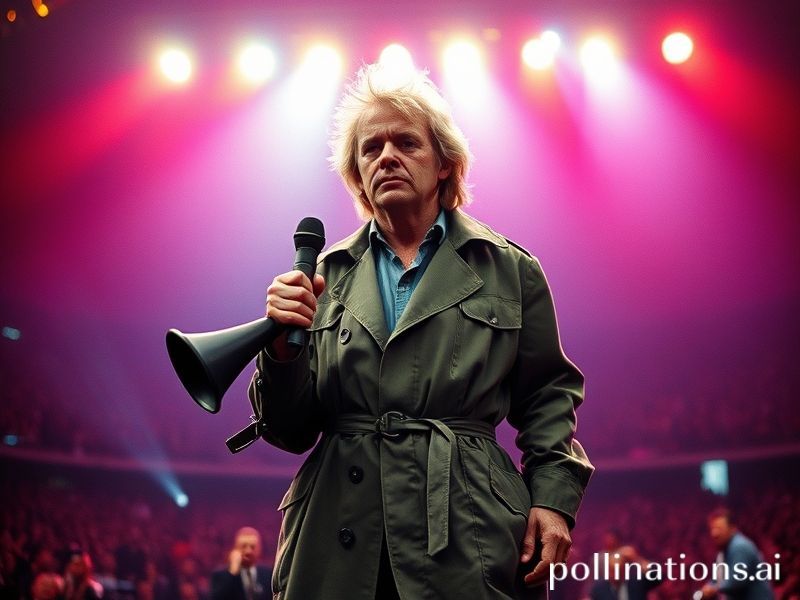Sir Bob Geldof: The Rock Star Who Weaponized Guilt, Then Watched the World Turn It into a Pop-Up Ad
The Last Time Sir Bob Rattled the World’s Cage
By Our Sardonically Seasoned Correspondent in Brussels (where the beer is strong and the guilt is stronger)
It is 1984, Ethiopia is a synonym for famine, and somewhere between a synthesizer riff and a drum fill, Bob Geldof—an Irish rock singer whose biggest hit until then involved telling a schoolgirl she didn’t like Mondays—decides the planet’s moral compass needs recalibrating. Cue Band Aid, Live Aid, and a transatlantic telethon that convinces even the most hardened arms dealers to pause, wipe a tear, and donate the loose change they found in the ashtray of their Learjet. Geldof, looking like a scarecrow who’s just read the Geneva Conventions, becomes the first rock star to weaponize guilt on a planetary scale. Overnight, “Do They Know It’s Christmas?” becomes the guiltiest earworm since your last Spotify Wrapped.
Fast-forward four decades. Geldof is Sir Bob now, complete with knighthood, a silver mane, and the weary eyes of a man who has seen every UN acronym in the dictionary. The planet, meanwhile, has upgraded its crises: climate collapse, algorithmic famine, and billionaires who holiday in low-Earth orbit. Yet the template Geldof sketched—celebrity guilt + satellite link-ups + a hashtag—remains the West’s go-to crisis cosplay kit. When K-Pop bands livestream for Ukrainian refugees or TikTokers dance for Sudan, they are essentially tracing over Sir Bob’s original crayon drawing, just with better lighting and corporate sponsors.
From Lagos to Lima, the reaction is a cocktail of gratitude and exasperation. Gratitude because, let’s be honest, food still reaches the hungry faster when a millionaire sings about it on BBC One. Exasperation because the same system that ships grain also ships weapons to the warlords who steal the grain. Geldof’s genius was never solving hunger; it was exporting the problem onto prime-time television so suburban London could feel momentarily absolved. As an Ethiopian friend told me, “We got the grain, yes. We also got the music video in which we all looked skeletal and grateful. That clip still plays in every NGO pitch deck.”
Then came the encore nobody asked for: Live 8 in 2005, a sort of Live Aid DLC pack with extra Bono. The goal? Pressure G8 leaders at Gleneagles to drop African debt. The outcome? A communiqué promising “full debt cancellation” that turned out to be a glorified refinancing scheme—like forgiving your student loans but only if you major in whatever Moody’s approves. Sir Bob, ever the optimist, declared victory anyway. Critics noted the concert’s carbon footprint could have funded irrigation for half the Sahel, but hey, Coldplay’s confetti cannons were biodegradable.
Today, Geldof is less stage-diver, more elder statesman with a LinkedIn profile. He pops up at Davos panels titled “Beyond Aid” next to crypto-princes promising to end poverty via NFTs of starving children. His hair is now the color of expensive tweed; his rage, once flammable, has calcified into a kind of genteel exasperation. Yet the world keeps auditioning for his old role. When Rihanna tweets about Malawian schools or Korean boy bands host Zoom galas for flood victims, they’re essentially playing Bob Geldof tribute acts—only the hair is better and the colonial aftertaste is masked by K-beauty filters.
What persists is the uncomfortable truth that Sir Bob exposed: empathy scales poorly. A planet capable of streaming 4K cat videos still struggles to feed actual cats—let alone people. Every new telethon proves the point: we can synchronize a billion screens but not a billion stomachs. And so Geldof’s legacy is less a solved crisis than a permanent pop-up ad in humanity’s browser: “Like hunger? Click here to feel 3% less complicit.”
In the end, Sir Bob didn’t end famine; he merely turned it into a recurring cameo on the global stage, like that one actor who dies in every disaster movie. The cameras eventually cut away, the credits roll, and the buffet reopens for VIPs. Meanwhile, the hungry wait for the sequel. Spoiler alert: it’s always a reboot.







